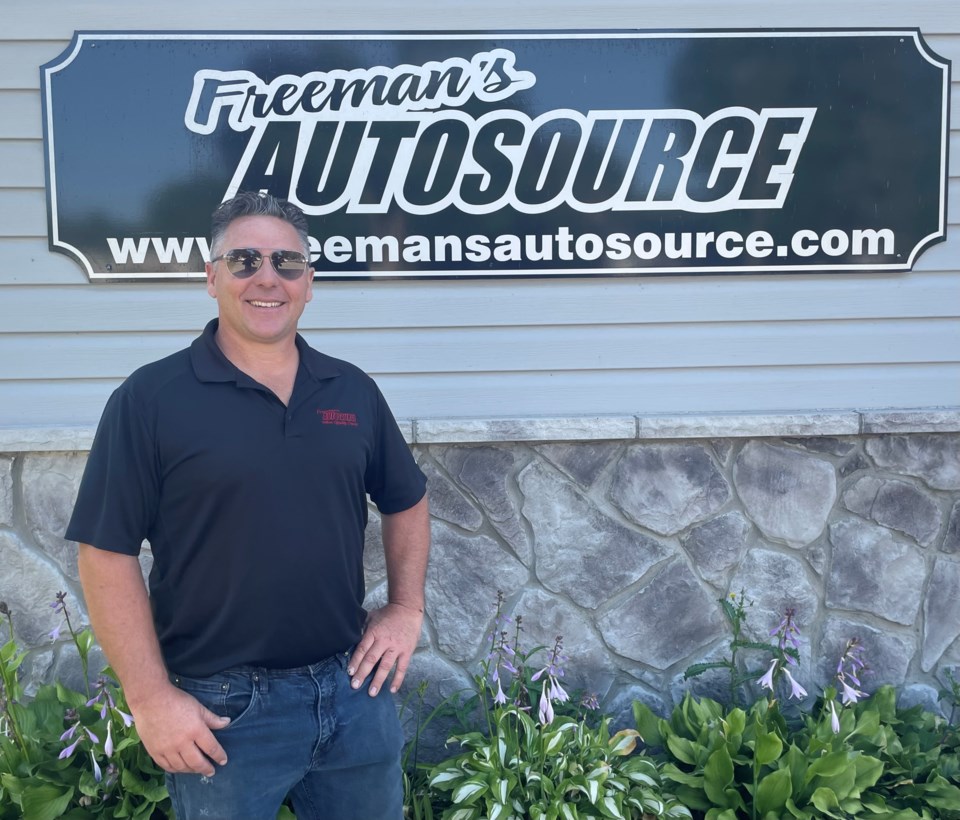Amidst a national shortage of new and used vehicles, local used-car dealerships are facing tough times.
As the prices of used vehicles climb due to a number of supply chain issues, local dealers have seen their sales decrease considerably over the past six months.
“I found that our walking traffic has dropped probably 60 per cent in the last six months. The phone’s not ringing … I think people are watching their money a little more because of the way the economy is going,” Dan Freeman, owner of Freeman’s Auto Source, said. “I could do 20 cars (per month in) a normal early-spring market … We are now down to five, sometimes four, maybe six — very low averages.”
Rising prices have come from a number of factors, local dealers said, including inventory being reduced by increased sales to other provinces and the United States, and a shortage of new cars worldwide, which in turn eats into the available inventory for used-car dealerships.
“We’re now also bidding against Americans who are buying our cars and taking them across the border because they have a shortage,” Freeman said. “With 30 cents’ (advantage) on the dollar, they’re buying a car for way less money than we can buy it for.”
Roger St. Onge, owner of Auto Choice Sales, added auction sales to other provinces have recently overtaken sales to the U.S.
“In the last six months, we have noticed that it’s not the U.S. — it’s out of province,” he said. “Ontario is the biggest province; we have the most cars, so now we’re seeing Quebec, Saskatchewan, Alberta, Winnipeg … It’s all Canadian provinces that are buying these cars up now.”
With supply chain issues reducing the number of new vehicles on the market, dealers of new cars are holding onto vehicles they would normally offload on used-car dealerships, as well.
“There’s this lack of new-car inventories worldwide. It’s not just Canada,. The new-car dealer now is selling cars they would have never sold years ago,” St. Onge said.
“You bring in a used car — let’s say it’s got 150,000 kilometres on it. Then let’s say it’s four years old. They would never keep that car (before); they would sell it to a used-car dealer like myself. Now they’re keeping it because their sales staff have got nothing to sell.”
St. Onge added he could typically source 200 to 500 used vehicles per year from car-rental businesses in the past, but due to reduced inventory, he has not purchased one in the past two years.
Rampant inflation, climbing gas prices and increased interest rates have also eaten into sales, local dealers said.
“There’s no such thing as zero per cent on a new car anymore. It doesn’t exist,” St. Onge said. “It’s now seven, eight, nine per cent. People see that (and) they get scared. We were doing used cars at 5.9. It’s now 8.9 per cent.”
A boom in truck sales during the COVID-19 pandemic has dried up due to rising costs, Freeman said, though he added other personal ventures have allowed him to get by.
“During COVID, trucks were just on fire because every family was out buying trailers,” he said. “Everybody was going to go camping and spend time with their family, so they were buying trucks like it was going out of style … and now, trucks have slowed right down, so there isn’t even a buyer for a pickup truck now because of the cost of fuel.”
All of these factors have led to a situation where cars, contrary to conventional wisdom, have appreciated in value over time.
Both Freeman and St. Onge said vehicles are still available for purchase, but the key issue is the increasing cost of doing business.
“Your prime example: a 2015 Chevy Cruze. Four years ago, you could buy that vehicle for probably $10,000, sell it for $12,000,” he said. “Now that same Chevy Cruze is $12,000, and they have to sell it for $14,000. That car should not be worth the same amount of money or more money than it was four years ago. Cars depreciate. That’s what they do … but now, because there’s a lack of vehicles, (prices) have gone up.”
In turn, higher prices have driven local dealers to reduce their profit margins, which further impacts their business.
“Our gross profit has dropped at least $1,000 a car, and that’s not because we’re making stupid amounts of profit,” St. Onge said. “You take that $1,000 away, you’re taking money away from your sales staff, you’re taking money away from everything. Everything had just gone through the roof.”
Under the current circumstances, St. Onge urged Orillians to shop locally, whether for used cars or anything else.
“What we need now is our town and related areas to support small businesses. I’m not talking about me. I’m talking about the guy down the street who sells a shirt. If you need gasoline, buy it at your local gas station. You need a car, please buy it at your local dealership,” he said.
“If you’re buying out of town, and you’re supporting those Toronto dealers, then the small guys will not be around.”



